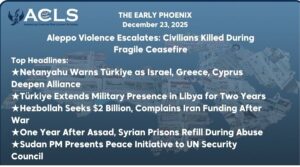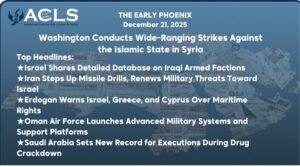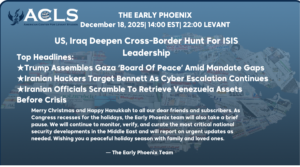Iran-Iraq Economic Alliance Grows Despite US Sanctions
TOP HEADLINES:
- Iraq Signs Five-Year Gas Import Deal with Iran Following U.S. Sanctions Waivers
- In Reversal, Netanyahu Will Send Senior Delegation to DC for Rafah Discussion
- US Fleet Commander Says US-UK Strikes Have Reduced Houthi Capabilities
- Turkey and Iraq Agree to Open New Border Crossing
- Egypt Warns Ethiopia of Consequences Over Dam Impact
=======================
★ ISRAEL & PALESTINIAN TERRITORIES
-
IDF Orders 40,000 Evacuation Tents in Preparation for Rafah Operation
The Israel Defense Forces (IDF) are moving forward with isolation and evacuation preparations in Rafah, Gaza’s last Hamas stronghold, despite international opposition to a ground operation. With the aim of targeting the remaining Hamas battalions, Israel plans to relocate over a million Gazans, ordering 40,000 tents for evacuees. This operation, stressed for its necessity by Jerusalem, faces U.S. pressure for alternative strategies.
-
Hamas Issues Rare Audio Message from Military Leader Mohammed Deif
Hamas released a rare audio recording of Mohammed Deif, their military wing’s commander, calling for Muslims worldwide to join the fight for Al-Aqsa Mosque’s liberation. The recording, purportedly from around the time of the October 7 attacks, encourages action across national borders for jihad. Following these events, Israeli forces targeted Deif’s familial home, intensifying efforts to locate him, including offering rewards for information leading to his capture.
-
Washington Presses Israel to Undertake Limited Operation to Target Remaining Hamas Leaders
As discussions continue between Israel and Hamas regarding prisoners, the US State Department, through spokesperson Matthew Miller, highlighted the ongoing potential for negotiations. However, under significant pressure for a ceasefire, US-Israeli talks have pivoted towards minimizing civilian harm during a potential Israeli military operation in Rafah, should diplomatic efforts fail post-Ramadan. This strategic shift signals Washington’s conditional support for a targeted approach to dismantle Hamas’s stronghold in Rafah.
-
In Reversal, Netanyahu Will Send Senior Delegation to Washington for Rafah Discussion
Israel has requested a new meeting date with the White House to discuss its military plans in Rafah following a sudden cancellation by Prime Minister Benjamin Netanyahu. The cancellation came after the U.S. abstained from vetoing a UN Security Council resolution calling for a ceasefire in Gaza, marking a strain in relations with President Joe Biden. Defense Minister Yoav Gallant held extensive talks in the U.S. to ease tensions. The U.S. wants the upcoming discussions to focus on avoiding a ground assault in Rafah, where over a million displaced Palestinians have sought refuge.
-
Hamas Sticks to Demands, Refuses to Release Hostages
Hamas says it will refuse to release Israeli captives until its demands are met, including halting aggression, withdrawing Israeli forces from Gaza, and allowing the return of displaced persons. In response, Israel accuses Hamas of presenting unrealistic demands and vows to continue its efforts to achieve its objectives, which include the release of all captives and the dismantling of Hamas’ military capabilities. The Israeli War Council will discuss Hamas’ rejection of a U.S.-proposed settlement and the future of negotiations.
-
Smotrich Booed Off Stage by Protestors in Eilat
Finance Minister Bezalel Smotrich and Transportation Minister Miri Regev faced vocal protests at a real estate conference in Eilat, leading to both ministers exiting the stage prematurely. Smotrich was confronted over military service issues, while Regev rebuked the protestors, emphasizing unity against Hamas. The incident reflects deep societal divisions over some of the government’s controversial policies.
-
Over 130 UK Parliamentarians Call for Halt on Arms Sales to Israel
More than 130 British MPs and Lords have signed a letter urging the government to stop arms sales to Israel as international criticism grows over Israeli actions in Gaza. The campaign, led by Labour MP Zarah Sultana, highlights concerns over the use of UK-made weapons in the conflict and cites a UN inquiry suggesting UK components in Israeli military equipment. Past UK responses to Gaza escalations included arms sale halts, a measure not yet taken in the current situation.
=======================
★ IRAN
-
Iraq Signs Five-Year Gas Import Deal with Iran Following U.S. Sanctions Waivers
After receiving new exemptions from the U.S. in March allowing Baghdad to settle financial obligations with Iran for gas purchases, Iraq’s Ministry of Electricity announced a five-year agreement to import up to 50 million cubic meters of natural gas daily from Iran. The deal aims to address Iraq’s chronic electricity shortages. This arrangement, which also includes oil and gasoline trade, doubles the previous gas supply and is crucial for Iraq’s electricity-dependent economy. Despite Iran’s own energy needs and production deficit, this deal marks a continuation of a decade-long energy partnership between the two countries. The agreement is seen as a temporary solution for Iraq as it faces pressure to diversify energy sources due to U.S. sanctions on Iran.
-
Shared Oil Fields with Iraq Help Iran Circumvent Sanctions
Iran benefits from shared oil fields with Iraq to evade international sanctions, with the oil’s origin—whether Iranian or Iraqi—remaining indeterminate. Despite global conflicts, oil prices have stayed relatively low, partly due to Iran’s undeclared oil production and its implicit acceptance by the U.S., aiming to prevent inflation and interest rate hikes. This scenario is further fueled by Iran’s substantial oil discounts to China, reducing China’s demand in the open market and impacting global oil prices.
-
U.S. Warns Pakistan Against Continuing Gas Pipeline Project with Iran
The United States has cautioned Pakistan about facing sanctions if it proceeds with the Iran-Pakistan gas pipeline project. This project, also known as the Peace Pipeline, initially signed between Tehran and Islamabad, aims to transport natural gas from Iran to Pakistan and potentially to India. With a projected length of 2,700 kilometers and an estimated cost now reaching $7 billion, the pipeline intends to supply 150 million cubic meters of gas daily to both countries.
-
Iran’s Currency Plummets to Record Lows
Iran’s rial has depreciated sharply, hitting a historic low with a 20% drop in value in less than three months, and trading at 610,000 to the US dollar. Despite a 48% increase in oil exports, revenue growth has been modest at 7.8%, hinting at potential discounts to Chinese refineries. The discrepancy between the volume and value of exports, alongside a trade imbalance exacerbated by increased imports and service trade deficits, has contributed to economic instability. The situation is further complicated by US sanctions, notably on Iraqi banks, restricting Iran’s access to hard currencies and exacerbating its trade challenges.
=======================
★ LEBANON
-
8 Killed in Israeli Airstrikes in Southern Lebanon; Hizballah Fires Dozen of Rockets on Israel
An Israeli airstrike in the border town of Naqoura, southern Lebanon, killed three, while another attack in Tayr Harfa claimed five lives. In response, Hezbollah launched a barrage of rockets at Kiryat Shmona, killing a 25-year-old worker in Kiryat Shmona’s industrial area. The Israeli emergency service confirmed the death following the attack, which involved over 30 rockets.
=======================
★ YEMEN
-
US Fleet Commander Reports US-UK Strikes Have Reduced Houthi Capabilities
Recent U.S. and British airstrikes have hit Houthi positions in Saada, Yemen, with the US Red Sea fleet commander reporting significant degradation of Houthi capabilities. Despite ongoing efforts and unpredictable timelines due to Iranian support for the Houthis, there’s a notable shift in Houthi attacks from cruise missiles to less dangerous drones.
-
U.S. is Pursuing Iranian Commander Behind Houthi Maritime Attacks
Iranian commander Abdolreza Shahlai, who is allegedly orchestrating the Houthis’ maritime assaults from Yemen, remains a key figure targeted by the U.S. with a $15 million bounty for information. Shahlai is the same IRGC commander who plotted to assassinate the Saudi ambassador to the United States in 2011. He has served as the lead IRGC representative to the Houthis for at least a decade.
-
Houthis Challenge Global Powers in Red Sea, Bloomberg Reports
Despite significant military efforts by the United States and its allies, the Houthis have managed to continue their high-intensity attacks in the Red Sea, showcasing an unprecedented resilience. Bloomberg highlights the Houthis’ capability to maintain their assault pace for an extended period, despite the costly and yet ineffective countermeasures by Western powers, underlining a significant setback in the Biden administration’s strategy to limit regional conflict escalation.
=======================
★ IRAQ
-
Iraqi Militia Leader Threatens to Attack US Forces if Biden Does Not Withdraw them From Iraq
An Iraqi militia leader warned President Joe Biden that his forces are prepared to escalate their campaign significantly if the U.S. does not withdraw its troops from Iraq, hinting at actions surpassing the Hamas attack on October 7, 2023. In an interview with Newsweek, Muhammad al-Tamimi, the secretary-general of the Al-Waad Al-Sadiq militia, described U.S. policy as reckless, threatening to expel American forces in coffins and demean the White House administration if an agreement on withdrawal is not reached.
-
Iraq and Turkey Agree to Open New Border Crossing
Iraq and Turkey have finalized discussions to inaugurate a new border crossing, aiming to enhance connectivity and development between the two nations. The agreement, facilitated by high-level officials from both countries, focuses on establishing a combined rail and road pathway. This initiative is part of broader plans to bolster bilateral relations and economic growth. Meetings will continue monthly in both Baghdad and Ankara to oversee the project’s progress and implementation in 2024.
-
Baghdad and Ankara to Collaborate on Iraqi Railway Development
In a move aimed at bolstering trade between Iraq and Turkey, Baghdad and Ankara have agreed to jointly develop Iraq’s railway sector as part of the Development Road project. This agreement, announced by Iraq’s Ministry of Transport, involves detailed technical discussions, training Iraqi personnel in Turkish railway academies, and planning a joint visit to the Turkey-Bulgaria border railway connection. The initiative also includes establishing coordination offices in Baghdad and Ankara to implement the project on a set timeline.
=======================
★ GULF REGION
-
UAE and Egypt Conduct Largest Airborne Aid Drop to Gaza
In collaboration with the Egyptian military, the UAE’s Ministry of Defense announced the largest airborne operation thus far, delivering 90 tons of aid to Gaza. This significant effort involved three aircraft targeting hard-to-reach areas in northern Gaza, marking the 16th drop and bringing the UAE’s total contributions to 664 tons. Additionally, joint operations with Jordanian forces extended the support operation even further.
-
Gulf States Support UNRWA with $85 Million
To avert a potential collapse of the agency, three Gulf countries have collectively donated $85 million to the UN Relief and Works Agency for Palestine Refugees (UNRWA), in response to halted funding from the US and several European nations following Israeli allegations. The Saudi commitment of $40 million marks the largest individual contribution, with Qatar and the UAE providing $25 million and $20 million, respectively. These donations aim to address the humanitarian crisis in Gaza and support UNRWA’s role in providing aid to Palestinian refugees.
-
Saudi Arabia’s FDI Surpasses $3.4 Billion in Q4 2023
Saudi Arabia experienced a significant increase in foreign direct investment (FDI) in the fourth quarter of 2023, reaching over 13 billion riyals ($3.4 billion), marking a growth of more than 16% compared to the third quarter. The total inward FDI for Q4 stood at approximately 19 billion riyals ($5 billion), reflecting the Kingdom’s growing appeal to international investors.
=======================
★ EGYPT AND NORTH AFRICA
-
Egypt Warns Ethiopia of Consequences Over Dam Impact
Egypt’s Irrigation Minister states that Ethiopia will face repercussions for any harm caused by the Grand Ethiopian Renaissance Dam to downstream countries, based on a principle agreement among Egypt, Sudan, and Ethiopia. Despite stalled negotiations, Egypt asserts its right to take necessary measures to protect its water security and outlines new water conservation strategies in response to potential droughts exacerbated by the dam.
=======================
★ SYRIA
-
Senior Senator Urges Biden to Tighten Isolation of Syria’s Assad Regime
Jim Risch, the senior Republican on the Senate Foreign Relations Committee, called for increased isolation of Syria’s Assad regime and the passage of the Anti-Normalization with Assad Act. This comes after the U.S. Treasury imposed sanctions on individuals and entities supporting the Syrian regime through drug trafficking and financial operations under the Caesar Act. The sanctions targeted 11 individuals and companies, including those involved in a $100 million Captagon and cannabis shipment intercepted by Greek authorities in 2018. Risch has accused Assad of transforming Syria into a “narco-state.”
-
Syrian Regime’s Central Bank Tries to Downplay Concerns as Inflation Hits 800 Percent
The Syrian Central Bank downplayed inflation fears, stating the situation is not alarming. It confirms there’s no current need for currency reform such as introducing higher denominations or removing zeros. Despite these reassurances, the Ministry of Finance has scheduled its second Treasury bonds auction for 2024 on April 22, aiming to issue bonds worth 150 billion Syrian pounds over a four-year term. This move comes as the Syrian regime is under scrutiny for exacerbating the Syrian pound’s decline and skyrocketing inflation rates, now estimated at 800%.
=======================
★ TURKIYE
-
Erdogan Calls for Increased Pressure on Israel to Adhere to UN Security Council Ceasefire Resolution
Turkish President Recep Tayyip Erdogan has urged for intensified international pressure on Israel to comply with a UN Security Council resolution demanding an immediate ceasefire in Gaza. Speaking at a rally for the “People’s Alliance,” Erdogan welcomed the resolution, which was supported by 14 out of 15 member states, with the United States abstaining. He emphasized Turkey’s commitment to fulfilling the resolution’s requirements and vowed to strive for peace and stability in Gaza. Erdogan also condemned the “massacres” committed by Israel against Palestinians and praised the Palestinian resistance as a lesson in humanity and courage.
-
Israel Denies Turkey and Qatar’s Requests for Humanitarian Aid Drops in Northern Gaza
Israel has rejected requests from Turkey and Qatar to deliver humanitarian aid to northern Gaza. This decision comes as nine other countries, including the United States, Jordan, Egypt, the UAE, Netherlands, Germany, Belgium, France, and recently Singapore, received approval for aid drops in Gaza. Israel’s refusal is attributed to the absence of diplomatic relations with Qatar and a significant political rift with Turkey since the beginning of the October 7 conflict.
-
Russian Oil Companies Face Payment Challenges as Türkiye and China Increase Bank Scrutiny
Russian oil firms are experiencing significant delays in receiving payments from China, Turkey, and the UAE due to heightened sanctions compliance by banks in these countries, wary of US secondary sanctions. This increased scrutiny, which includes the requirement for written guarantees that transactions do not involve entities from the US SDN list, has disrupted the flow of funds to Moscow, aligning with US sanctions goals. The situation has been exacerbated since December, following a US Treasury executive order that heightened the risk of secondary sanctions for evasion of the Russian oil price cap, leading to additional documentation and verification processes that prolong transaction times.
=======================
📌 Incase you missed it,
📰 THE EARLY PHOENIX March 27, 2024
📰 THE EARLY PHOENIX March 26, 2024
📰 THE EARLY PHOENIX March 25, 2024
🔗 Follow the latest news from the American Center for Levant Studies via Google News



